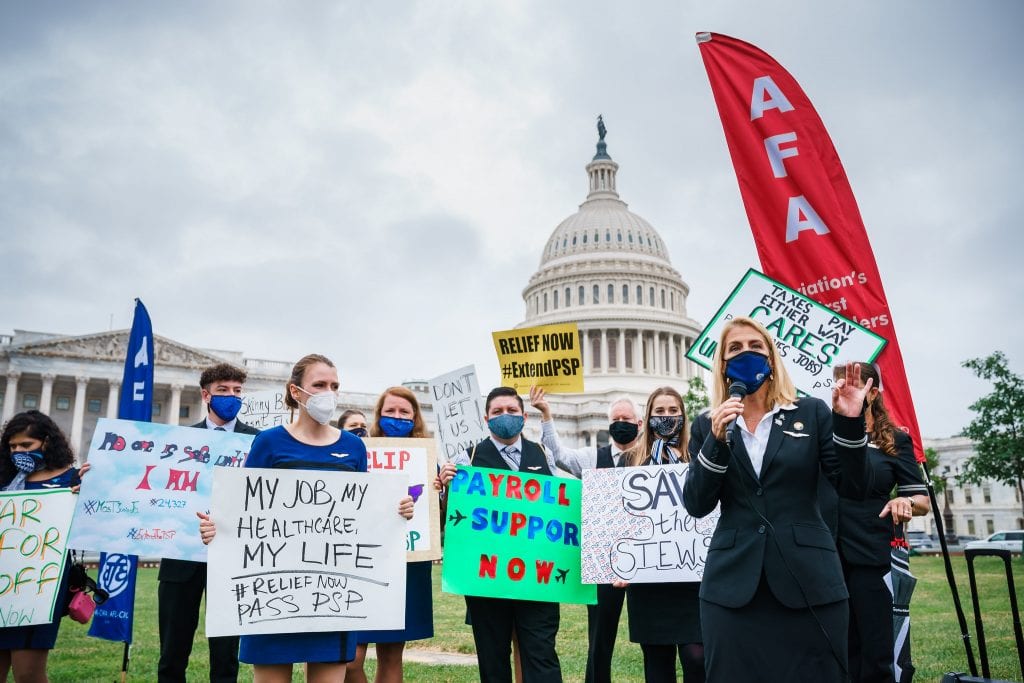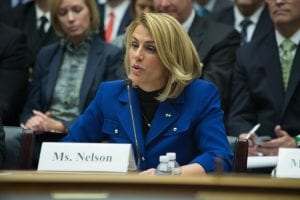Skift Take
Flight attendants are the face of an airline at 30,000 feet and the first line of defense, but the pandemic is taking a toll on the workforce. If airlines and the government are committed to recovery, taking care of these frontline workers is key to reassuring public confidence.
Working conditions and the stress of the pandemic’s effects on the travel industry are wreaking havoc on lives of flight attendants a year into the pandemic. For people in the airline industry having to try to deal with all this on their own, and particularly for flight attendants, a lack of good information from the U.S. government has led to the isolation of people, genuine desperation as well as real disconnection from families and friends, Sara Nelson, president of the Association of Flight Attendants-CWA (AFA), said in an interview. AFA represents almost 50,000 flight attendants at 17 airlines.
“We’re seeing a dramatic increase on mental health issues and that ranges from a lot of issues people are concerned about. Their health or their family’s health or actually dealing with very difficult things … having lost someone or having someone in the hospital,” Nelson said. “And then you layer on top of that the real insecurity about whether or not we’re even going to have a job.”
To date, internal tracking by AFA shows that over 3,500 flight attendants have tested positive over the course of the pandemic and approximately 18 have died across the industry, an AFA spokesperson said.
“And what has been very difficult is that in the beginning, you could track flight attendants getting exposed to Covid at work. And also, it was very clear when a flight attendant had passed,” Nelson said. “A year later, community spread makes it virtually impossible to tell whether or not someone has contracted this at work.”
Other stressors include flight attendants having to leave their base airport for financial or other reasons and having to commute via air to work at another base. Many flight attendant live in “crash pads”— a shared apartment or rooming house near an airport hub with bunk beds used by different crew members on a rotating basis. Many of these crash pads have had to close, due to sanitary precautions and pandemic social-distancing requirements. This is a crushing blow for junior crew members who have traditionally shared these living spaces with as many as 18 people and are now struggling to find affordable housing.
And in the air, flight attendants have to worry about potential exposure to the disease. Nelson said contact tracing is crucial to safeguarding both the traveling public and cabin crews who may have been exposed to the virus. “And if the symptoms come on, and we’ve seen this three or four days later, then they’ve already exposed all these people,” said Nelson.
Part of the problem, Nelson said is that the airlines might not be notified or may not be aware that there was a case and are finding out, in some cases, 10 days after the flight occurred. Nelson thinks the airlines could do more than the Centers for Disease Control and Prevention (CDC) is requiring, because they all know what the realities of the aircraft cabin are.
For their part, airlines have routinely expressed the industry’s belief that contact tracing is a key measure that will instill confidence for employees and the traveling public, that airlines and the federal government are prioritizing their health and safety, an Airlines for America (A4A) spokesperson said, adding that all A4A member carriers comply with all CDC and Federal Aviation Administration (FAA) safety guidelines. “The safety and wellbeing of all passengers and employees is the top priority of U.S. airlines,” said Airlines for America (A4A) Managing Director Katherine Estep.
Nelson and the union continue working with the airlines to try to cut down on the amount of contact crews have with passengers during the service portion of flights and have successfully limited or removed alcohol sales because she said “people will get a little sloppy and then [are] not wearing their masks properly.” But the problem, she stresses is that the guidance from CDC is the standard (for airlines).
The CDC guidelines are based on being in contact with a person who has a confirmed case for 15 minutes or more. These guidelines don’t take into consideration the aircraft environment. Flight attendants working in the cabin – in an enclosed environment – are required to interact with passengers, walk through the cabin, monitoring it, checking on security items and picking up passengers’ trash, Nelson said.
To combat the health risks to flight attendants, Nelson has been championing vaccines. In a congressional hearing this month, she proposed that the Department of Transportation along with other federal agencies put together a federal vaccination program for essential workers, including aviation frontline workers.
“Flight attendants, in particular, have contact with a large number of people every day, typically crossing state lines, putting them at increased risk of infection,” Nelson said. “To facilitate an efficient vaccination rollout for this highly mobile workforce, the federal government should set up vaccination clinics at major airports to make it easy for airline crew members to access both their first and second doses, without disrupting their travel schedules.”
The return of an adequate supply of personal protective equipment kits including enough N95 masks for crews, is something else Nelson said is needed.
Following historic unemployment and furloughs facing the airlines, the International Air Transport Association (IATA) in February introduced retraining for flight attendants leaving the industry.
While Nelson thinks any resources for flight attendants at this moment are good, she doesn’t see IATA’s retraining as a solution, when realistically during this pandemic there aren’t really other jobs to go to.
The Daily Newsletter
Our daily coverage of the global travel industry. Written by editors and analysts from across Skift’s brands.
Have a confidential tip for Skift? Get in touch
Tags: airline, association of flight attendants, coronavirus, coronavirus recovery, flight attendants, sara nelson
Photo credit: AFA-CWA president Sara Nelson with some of the 50,000 flight attendants she represents at the U.S. Capitol in September. AFA-CWA / Skift

